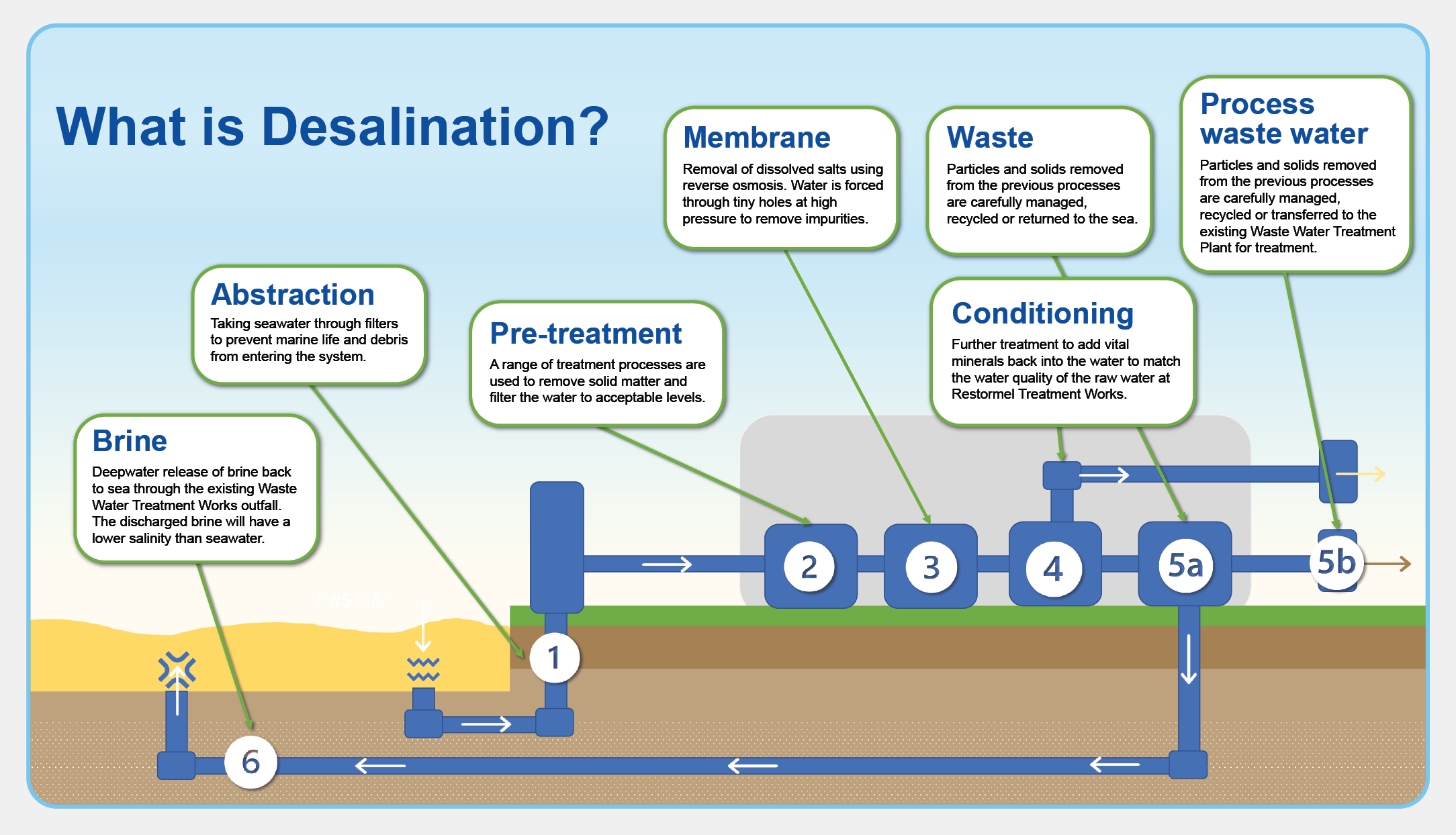
Desalination
Find out more about our new South Cornwall desalination project
Why is desalination needed?
Most drinking water in Cornwall comes from rivers and reservoirs that rely on rainwater. When there is not enough water to meet demand, more water is taken from rivers, such as the Fowey, which can impact wildlife.
The region’s population is growing, tourism brings more people in summer and climate change makes heatwaves and droughts more likely. Desalination is one of a set of measures aimed at improving the region’s water resilience.
What is Desalination?
1. Abstraction
Taking seawater through filters to prevent marine life and debris from entering the system.
2. Pre-treatment
A range of treatment processes are used to remove solid matter and filter the water to acceptable levels.
3. Membrane
Removal of dissolved salts using reverse osmosis. Water is forced through tiny holes at high pressure to remove impurities.
4. Conditioning
Further treatment to add vital minerals back into the water to match the water quality of the raw water at Restormel Treatment Works.
5A. Waste
Particles and solids removed from the previous processes are carefully managed, recycled or returned to the sea.
5B. Process waste water
Particles and solids removed from the previous processes are carefully managed, recycled or transferred to the existing Waste Water Treatment Plant for treatment.
6. Brine
Deepwater release of brine back to sea through the existing Waste Water Treatment Works outfall. The discharged brine will have a lower salinity than seawater.
Supporting documents
Benefits of desalination
Delivering desalination would greatly increase Cornwall’s resilience to climate change. It would:
Our proposals for Phase 1
Due to the complexities of this project, the sensitivities around the marine impacts and the pressing need to secure resilient water supplies, it has been necessary to phase the delivery of desalination in Cornwall.
For phase 1, we will need to go through the statutory planning and regulatory approval processes.
This will include planning applications for the following:
- A desalination plant on land at Par docks (which avoids the need to construct new pipelines into the marine environment)
- A Nature Based Solution lagoon and Integrated Constructed Wetland (NBS)
- An extension to Restormel Water Treatment Works.
This will be delivered alongside a 13km underground pipeline route taking desalinated water from par docks to Restormel (via an NBS).
The phase one desalination plant will comprise of the following:
- A desalination plant (made up of approximately 5 shipping container sized units) capable of producing up to 2.5 million litres of desalinated water per day
- Two 1.2km above ground pipelines between the desalination plant and Par Waste Water Treatment works, to avoid the need for new infrastructure out to sea.
Please refer to public consultation section below to see our proposals in more detail.
What about ‘Phase 2’?
Our Phase 1 proposals are the only viable project at this stage. We need to develop a viable scheme which will address the specific water resilience needs for the South west, particularly Cornwall.
We have listened to the feedback we have received from our customers so far, and you have told us that you have concerns regarding the potential marine and environmental impacts of desalination. That is why we are taking more time to fully understand the complex and sensitive marine environment. When we are satisfied that we have a viable scheme that meets all requirements, this will be subject to separate consultations, planning applications and regulatory scrutiny
However, as a responsible business we must ensure that we plan ahead and have a drought resilient water resource for 2025 that meets our customers’ expectations of us. This is why this project (Phase 1) is required.
We are committed to consulting on any future applications at the appropriate time.
Phase 1: Public consultation now open
We have now officially launched our public consultation for our phase 1 planning applications. In addition to our three public consultation events – we have also provided all of the materials that will be displayed at the events on our web page.
Your feedback is important to us and will be considered carefully prior to the submission of planning applications.
You are able to provide your feedback using the following methods:
- Online feedback form
- Write to us at Freepost SWW desalination (no stamp required).

